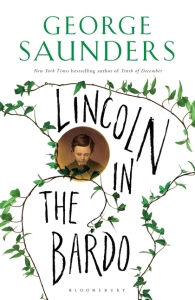 Told through a chorus of over 160 different voices, ‘Lincoln in the Bardo’ by George Saunders follows the aftermath of the death of Abraham Lincoln’s eleven-year-old son Willie in 1862 from typhoid fever during the American Civil War. Willie finds himself trapped between death and rebirth with other spirits in the cemetery who believe he should proceed to the next stage of the afterlife. However, Willie is resistant as he wants to spend more time with his distraught father who regularly visits the crypt to mourn his loss.
Told through a chorus of over 160 different voices, ‘Lincoln in the Bardo’ by George Saunders follows the aftermath of the death of Abraham Lincoln’s eleven-year-old son Willie in 1862 from typhoid fever during the American Civil War. Willie finds himself trapped between death and rebirth with other spirits in the cemetery who believe he should proceed to the next stage of the afterlife. However, Willie is resistant as he wants to spend more time with his distraught father who regularly visits the crypt to mourn his loss.
Saunders is best known for writing short stories and won the Folio Prize in 2014 for his collection ‘Tenth of December’. ‘Lincoln in the Bardo’ is his first novel published earlier this year and the reviews so far have been almost unanimously positive but I have to confess that I struggled with this book. It is undoubtedly ambitious and pushes a lot of boundaries in terms of defining what a novel can be but I also found it difficult to follow and felt more than a bit lost in some parts.
Admittedly, given that the chorus of voices is effectively written as a play script or a long list of annotated quotes rather than conventional prose, it probably didn’t help that I read ‘Lincoln in the Bardo’ on a Kindle and all the white space doesn’t make for the best reading experience on a smallish device. On the other hand, reading or listening to ‘Lincoln in the Bardo’ in any format is never going to be entirely straightforward. ‘Bardo’ is a Tibetan word for ‘limbo’ or ‘transitional state’ between death and rebirth, and as well as being directly applicable to Willie Lincoln’s purgatorial state, it is also very fitting as a description of the book itself given that the text doesn’t fit neatly into a specific format of prose.
Saunders ambiguously interweaves fictionalised historical narratives with real accounts and one of the aspects of the book I enjoyed the most were the characters’ conflicting and unreliable descriptions of events, particularly for the period leading up to Willie’s death. However, although there are a handful of central characters who appear regularly throughout the book such as the ghosts who reside in the cemetery, Hans Vollman and Roger Bevins III, I think there are simply too many different voices and very few of them are truly distinctive.
‘Lincoln in the Bardo’ ultimately didn’t work for me because of the numerous structural distractions, but it seems to have struck a chord with many others, particularly for the innovative way in which the themes of grief and loss are explored. Many thanks to Random House for sending me a review copy via NetGalley.





I thought it was a very interesting book, and even quite fun despite the fairly dark subject matter. I’m not as enthusiastic as many people have been, but I did enjoy the reading experience. I can see how it must have been very difficult on Kindle, though; I read a public library copy. I had been wondering if the historical passages were authentic or not.
LikeLike
Yes, I don’t think Kindle is the ideal format for this one unfortunately. It’s certainly a unique book!
LikeLike
I watched Saunders speak a few weeks ago, and they ‘acted’ out scenes from his book with a few different actors. This was a very effective way of experiencing this book, but it put me off actually buying it, because I knew I wouldn’t enjoy reading it.
LikeLike
Yes, I generally prefer hearing experimental prose being “performed” live although I think I would still struggle to follow the audiobook of Lincoln in the Bardo because of the number of different voices.
LikeLiked by 1 person
good point-the audio book is probably a bit intense
LikeLiked by 1 person
This book has got such a unique title that I am drawn to it, but I totally get your point about reading it on a Kindle. And it sounds like I need to plan it when I have lots of time to devote to thinking about it.
LikeLike
Yes Kindle wasn’t the best format – definitely a thought-provoking book though!
LikeLiked by 1 person
The premise of this book attracts me but I think I will take your word for it and give it a miss (particularly because I’d be reading it on Kindle – ironic given that I commented on a blog post today in support of Kindles being able to do what hard copies can do!).
LikeLike
Some people might be less bothered by reading it on a Kindle but I don’t think it’s ideal for this particular book.
LikeLike
I loved this one but it’s interesting to hear another perspective. I read the hard copy and I’ve heard a lot of positive reviews who listened to the audio book. Format definitely makes a difference for this one.
LikeLike
Yes, maybe following the book and audiobook together might have helped me enjoy this one more!
LikeLiked by 1 person
Thanks for your honest review! This is on my list, I’m thinking about getting it as an audiobook; and yes, nervous about coping with all those voices! George Saunders has spoken about how reading Infinite Jest gave him the idea, as it is a series of monologues … Having just finished Infinite Jest I think I need a little break before venturing into this one! 😉
LikeLike
I think it will be a while before I tackle Infinite Jest! Hope you enjoy the audiobook of Lincoln in the Bardo 🙂
LikeLiked by 1 person
Pingback: The Man Booker Prize 2017 Longlist: Predictions, Possibilities and Preferences | A Little Blog of Books
Pingback: The Man Booker Prize 2017 Longlist | A Little Blog of Books
Having now read Lincoln in the Bardo (for the Man Booker Longlist) I went back to read what you had written. I rather enjoyed the Gothic nature of this novel, but I am now struggling through Infinite Jest, which supposedly inspired GC. I wonder how?? I would not want to put anyone completely off reading a book, but at 900 plus pages it HAS to be superlative. I would recommend Proust instead!
LikeLike
I didn’t know Infinite Jest had inspired George Saunders – I can’t say I’m tempted right now!
LikeLike
Pingback: Solar Bones by Mike McCormack | A Little Blog of Books
Pingback: Elmet by Fiona Mozley | A Little Blog of Books
Pingback: The Man Booker Prize 2018 Longlist: Predictions, Possibilities and Preferences | A Little Blog of Books